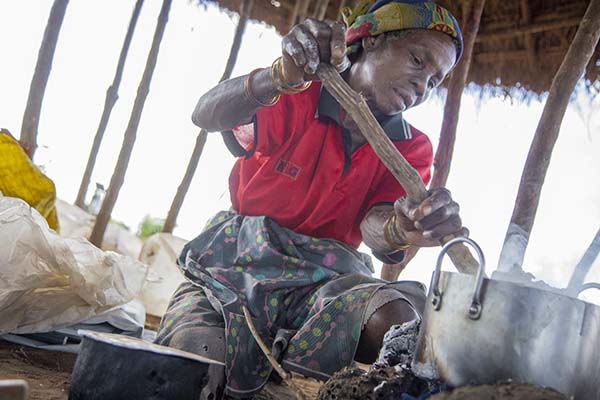CRS in Mozambique
Mozambique is a tropical country with over 2500 kilometers of coastline along the Indian Ocean. The country gained independence in 1975 after almost five centuries as a Portuguese colony. Parts of Mozambique are still recovering from a 16-year civil war that officially ended in 1992. The recovery is complicated by other issues such as a high HIV prevalence rate, large-scale emigration, and cyclical flooding and drought. Additionally, the country suffers periodic cyclones and tropical storms which cause property destruction and economic disruption.

Joanna Thomo prepares a meal for her family. Her family received a kitchen kit, hygiene kit, farm tools and seeds during a distribution for people affected by cyclones in Mozambique. Photo by Dooshima Tsee/CRS
Since October 2017, the northernmost province of Cabo Delgado has experienced attacks by non-state armed groups. As a result of the conflict, by the end of 2020 more than 670,000 people had left their homes in search of safety, increasing food insecurity as families are forced to flee their homes and abandon their crops and other livelihoods. The attacks continue to hinder the ability of humanitarian organizations to provide comprehensive aid and to help survivors of both armed attacks and Cyclone Kenneth rebuild lost assets. This is exacerbated by the more recent threat of COVID-19, limiting the ability to reach those most in need.
Catholic Relief Services is a facilitating partner to the national-level Caritas Moçambicana and several diocesan-level Caritas members. CRS provides operational, technical, and program management support to these sister Caritas organizations. In 2019 and 2020, CRS worked closely with Caritas members in each affected diocese to support comprehensive emergency relief and recovery efforts in response to Cyclones Idai and Kenneth.
Stats
People Served: 36,318
Population: 30,888,034 (July 2021 est.)
Size: 308642 sq mi; slightly larger than Texas; and about twice the size of California.
Our Partners
Become a Partner ›CRS' History in Mozambique
CRS established an office in Mozambique in 2017 at the invitation of the Episcopal Conference of Mozambique. Since then, CRS has been delivering emergency and development programs in Mozambique that build trust, strengthen livelihoods, and support disaster and conflict-affected communities through their recovery.
Through its close partnership with Caritas in Mozambique, CRS has comprehensive geographic reach into communities in every province across the country. CRS brings decades of diverse technical expertise and experience in local capacity strengthening which improve the quality of Caritas' programming approaches.
CRS is a world leader in market-based approaches for humanitarian response and often uses these in Mozambique. These provide affected families with cash or vouchers to buy critical relief items, such as food, shelter and hygiene products, in local markets where shops are functioning. This helps support the recovery of the local economy and enables families to buy the items they need most. Where markets have been destroyed and shops are not available, CRS supports Caritas to distribute supplies directly to people in need.
As part of its flagship project for 2021, Protect and Rebuild, CRS partners with Caritas Pemba to provide emergency food rations, emergency shelters, shelter repair kits, emergency latrine structures, distributions of non-food items like soap, and agriculture inputs to conflict-affected families and internally displaced persons in Cabo Delgado. CRS also supports IDP and host family participation in hygiene promotion sessions to mitigate the risk of contracting COVID-19 and other communicable diseases. Protect and Rebuild is primarily supported by USAID’s Bureau for Humanitarian Assistance with additional support from Latter-day Saints Charities, Islamic Relief USA and the Bill & Melinda Gates Foundation.
Beyond emergency programming, CRS has developed a variety of programs in peacebuilding, microfinance, and conservation agriculture. CRS is working with the national Caritas organization as well as strategic dioceses to implement CRS’ approach to peacebuilding and social cohesion in partnership with the Institute for Peace in Africa. The program targets youth and religious leaders in conflict areas. CRS is also supporting a national program for Savings and Internal Lending Communities; a microfinance approach CRS currently employs and served an estimated 3.7 million people worldwide in more than 44 countries in 2020. As part of its conservation agriculture approach, CRS is running a pilot program for green-manure cover crops in a drought-stricken diocese in southern Mozambique aiming to improve yields through soil nutrition improvement.


